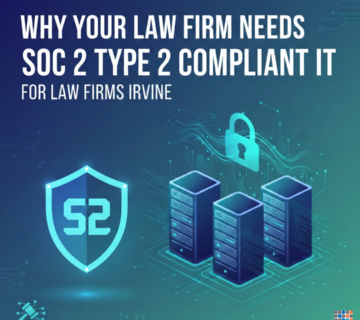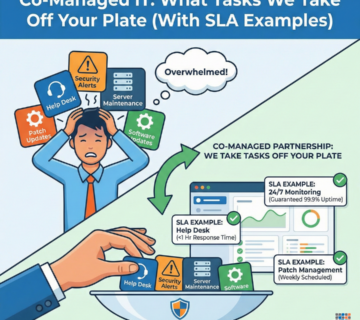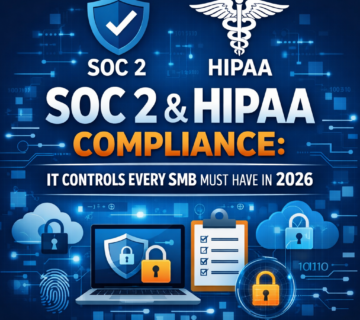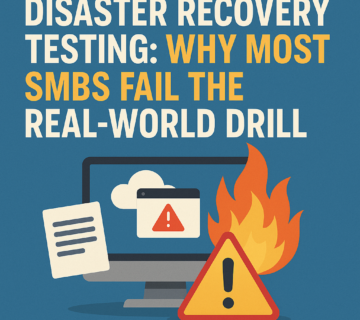What Does It Mean to Be Compliant?
In recent years, the business world has witnessed a rapid rise in the number of regulatory standards with which companies have to be compliant. Not sure what that means? Find out below.
One dictionary definition of the word “compliance” is “inclined to agree with others or obey the rules, especially to an excessive degree.” However, this probably isn’t what you were searching for when you looked up information on business compliance. Surprisingly, although virtually every industry has its guidelines, finding useful information on compliance can become a headache.
In today’s highly regulated business world, it’s fairly easy to end up on the receiving end of heavy penalties or fines without the right information. That’s why our team at Technijian came up with this article.
Interested in finding out what compliance is and what it means for your business? Let’s find out!
What Is Compliance?
In the business IT world, compliance is the act of meeting the guidelines, regulations, and legislations of industry or government-mandated standards.
What Are the Prominent Compliance Standards?
- SOX: The Sarbanes-Oxley Act was passed to protect shareholders and the general public from accounting errors and fraudulent practices in the enterprise. This standard outlines several rules, among them guidelines on storing and retaining business records in IT systems.
- HIPAA: The Health Insurance Portability and Accountability Act Title II has a section on administrative simplification. It requires healthcare organizations to standardize electronic health records systems. It also includes security measures aimed at protecting patient confidentiality and data privacy.
- PCI DSS: The Payment Card Industry Data Security Standard defines policies and processes designed by MasterCard, Visa, American Express and Discover to secure debit, credit and cash card transactions.
- FISMA: The Federal Information Security Management Act mandates federal agencies to perform annual assessments of information security programs to keep data risks at a minimum.
The list of standards is long. Not only do these standards vary by country, state and industry, but there’s also some degree of overlap between some of them. For multi-national organizations, especially, remaining aware of all the relevant guidelines is a major concern.
How Can You Stay Compliant With All the Regulatory Standards?
It would be best to find out which standards apply to your business and research all the information you can find on them for starters. One handy approach you can employ in some cases is to head to the standard’s governing website to learn about implementation specifications. Simply put, implementation specifications are detailed descriptions of the processes organizations have to follow to meet a particular standard.
To ensure you don’t leave anything to chance, you need to enlist a managed IT services company, especially if you lack experience with handling compliance. However, whether it’s your first time or you are a seasoned veteran, partnering up with a reputable IT vendor is better in the long run. For instance, a capable IT partner can help you pinpoint gaps in controls that could lead to unsuccessful conclusions.
On your side, we recommend hiring a full-time individual or team to monitor compliance. But if your business is growing, you could put an existing team member in charge of compliance over the review period.
Why is Compliance Considered an Investment Rather than an Expense?
Compliance should be viewed as an investment rather than a mere expense due to its multifaceted benefits. It not only enhances a company’s reputation but also boosts customer trust and loyalty, facilitating easier market expansion and potentially added revenue streams. This proactive approach can significantly mitigate risks, sidestep costly legal issues, and establish a solid foundation for sustainable growth.
How Can Businesses Maintain Consistent Compliance?
To maintain consistent compliance, businesses should consider a proactive approach that focuses on the implementation of strategic measures to safeguard against potential violations and inefficiencies. Compliance should be viewed as an essential investment in your business’s future, enhancing its reputation, increasing customer trust, and facilitating growth.
Businesses can maintain consistent compliance by adopting the following strategies:
- Establish Identity Governance and Administration (IGA): Initiate a system where access to various IT resources is strictly managed and monitored. This ensures that only authorized personnel have access to sensitive information, minimizing the risk of internal breaches.
- Set up Application Access Governance (AAG): Deploy mechanisms to regularly review and regulate who accesses different applications and to what extent. This helps identify irregularities or potential breaches early on and swiftly address them.
- Enhance Risk Management Techniques: Utilize risk-based strategies within your application frameworks to prevent and address potential threats proactively. This method allows for more focused and effective control measures that are tailored to specific risks faced by the business.
- Monitor and Document Compliance Activities: Keep a thorough record of all compliance-related activities to simplify the audit process. This not only promotes transparency but also enhances accountability and provides evidence of compliance.
By embedding these steps into your operational framework, you not only avoid the hefty penalties associated with non-compliance, which can cost significantly more than compliance implementation, but also cement a foundation for sustainable growth. Furthermore, businesses unsure of how to effectively deploy these strategies can consult with specialized IT services.
For enhanced support, consider partnering with expert IT consultants, such as CMIT Solutions based in Tempe, USA. With their broad spectrum of IT support and consulting services, they provide tailored guidance to solidify your compliance program and protect your data effectively.
What are the Monetary Consequences of Non-Compliance?
The financial penalties for failing to comply with regulatory standards can be severe, serving as a deterrent against violations. A prime example of this is the enforcement framework of the General Data Protection Regulation (GDPR), enacted by the European Union to safeguard consumer privacy and data. When a company breaches this regulation, it faces substantial fines, which are structured into two distinct tiers to reflect the severity of the non-compliance:
- For less severe violations, the fines can reach up to 11.03 million USD or 2% of the firm’s global annual turnover from the preceding financial year, depending on which amount is greater.
- More serious infringements can attract penalties of up to 22.07 million USD or 4% of the company’s global annual turnover from the prior financial year, whichever is larger.
These fines are imposed by the data protection authorities in each EU member state, who consider various factors to assess the gravity of the offence and determine the appropriate fine. Hence, the monetary repercussions of disregarding regulations like the GDPR are considerable, potentially reaching millions of dollars, and they represent just one aspect of the broader damages that non-compliance can inflict on an organization.
How Can Organizations Ensure Organizational Compliance?
To ensure organizational compliance effectively, organizations can follow a structured approach with multiple strategic steps:
- Begin by establishing a robust Identity Governance and Administration (IGA) system. This system should manage and secure access rights across the IT network, ensuring that only authorized individuals have access to critical information.
- Next, introduce stringent Application Access Governance (AAG) frameworks. These are designed to monitor and control application access, preventing and mitigating access-related infringements before they happen.
- Enhance your application security measures by incorporating risk-based controls. These controls should focus on identifying, assessing, and mitigating risks associated with application usage.
- Finally, maintain continuous oversight and documentation of these controls. This aids in refining audit operations and demonstrates a clear commitment to regulatory compliance through transparent practices.
By methodically applying these steps, organizations can build a comprehensive compliance program that not only meets but exceeds regulatory requirements.
What are the Consequences of Non-Compliance?
In today’s rapidly expanding digital environment, companies that fail to implement automated controls face significant risks. The absence of such systems forces security teams to manually handle large amounts of data to check for misconfigurations, unauthorized access, and breaches in separation of duties. These activities are not only resource-intensive but also prone to human error, increasing the likelihood of security lapses. Consequently, businesses that do not maintain compliance may face severe penalties, operational disruptions, and a loss of trust from clients and partners, making non-compliance a costly affair.
Is Compliance Necessary for Businesses?
Compliance is essential for businesses that value the safety and security of their customers and employees. The importance of adhering to legal standards cannot be overstated, as non-compliance poses significant risks that can lead to severe consequences. While it is true that compliance requirements can be expensive and complex—especially for growing organizations—it is a critical investment. Regulatory compliance involves various departments and requires meticulous organization and execution. Ultimately, the cost of non-compliance, considering potential fines, legal issues, and damage to reputation, far outweighs the expenses associated with maintaining compliance. Therefore, for businesses looking to sustain and thrive, adhering to compliance regulations is indispensable.
Ready to Find Out Whether Your Southern California Business Is Compliant?
Technijian is an Orange County IT company providing reliable compliance support to businesses across Southern California.
Contact us now to book your first compliance consultation!






